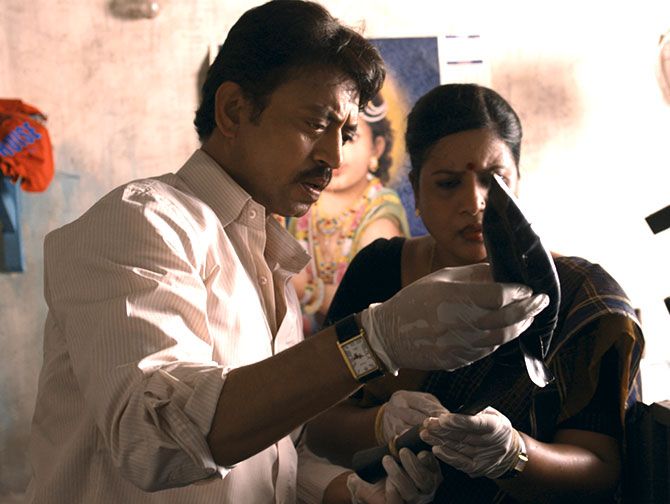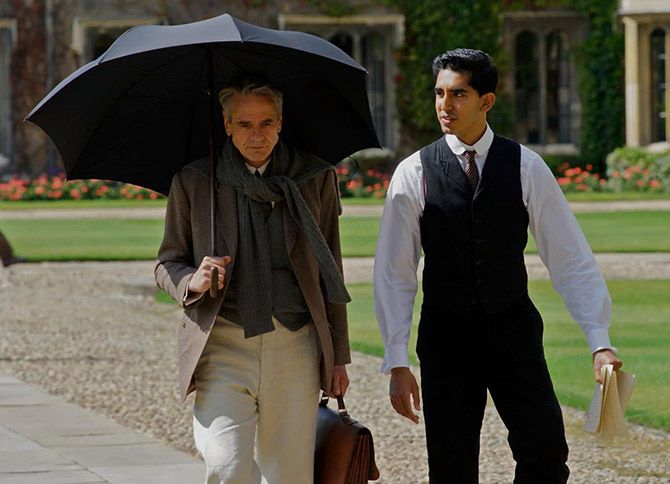'Talvar belongs to Irrfan Khan, who plays the chief investigating officer. With each new film,' reports Aseem Chhabra from the Toronto film festival, 'this very fine actor continues to surprise us and delight us.'

Did the makers of Angry Indian Goddesses and Parched share their scripts?
That is highly unlikely, but it is amazing how similar the two new films are -- both exploring female bonding and taking up some of the most explosive issues that women in India face these days.
In all fairness, the two films -- both had their world premieres at the 40th Toronto International Film Festival -- have very different treatments.
Angry Indian Goddesses is set in an old Portuguese house where five friends -- all women (including Tannishtha Chatterjee) -- arrive as guests of a former fashion photographer. The women come from different backgrounds, although some of them were friends in college.
In director Pan Nalin's (Faith Connection, Valley of Flowers) film, the intense period of bonding eventually results in some serious introspection and revelations, and a shocking conclusion that will change all the characters' lives.
Leena Yadav's (Teen Patti, Shabd) Parched takes place in a rural setting -- Gujarat, where the three female protagonists (again Tannishtha Chatterjee, Radhika Apte and Surveen Chawla) are childhood friends and have experienced all kinds of abuses from men in their lives. Their rebellion and the film's Thelma and Louise sort of ending gives a satisfying feeling to a film that at times is quite disturbing.
Both films are high in energy and strong in their feminist politics. They are beautifully shot and well acted. Audiences in India have openly accepted recent women-centric films including Kahani and Queen. So both Angry Indian Goddesses and Parched should have a good reception in India and in the Indian Diaspora.

This year's edition of TIFF was rich with films from India and those with Indian subject matters. Deepa Mehta is a TIFF favourite. She makes her home in Toronto and as TIFF's Director and CEO Piers Handling said last week, Mehta was at the festival 40 years ago.
This year Mehta brought her very Canadian film to TIFF -- Beeba Boys, a violent Sikh gangster saga set in Vancouver.
When Mehta told her producer (and husband) David Hamilton that she was thinking about writing a film script that would look at Sikh gangsters, he was concerned what her loyal audience would think. But he told the audience present at the sold out premiere screening of Beeba Boys at Toronto's Roy Thompson Hall that he was sure Mehta would bring her 'unique perspective' to the film.

And in introducing the film Mehta mentioned the connection between the country of her birth and her adopted country. "India is inside me with stories, but Canada gives me the freedom to express them," she said. She added that one of the reasons why she made Beeba Boys was because she was interested in directing a "kick-ass" film.
Beeba Boys is "kick-ass" film for sure, with a cast of seven cool male actors, including Randeep Hooda, Waris Ahluwalia and the Iranian-Canadian Ali Momen. They dress very fashionably, flash guns, kill people, and stay at homes with their moms and dads. And as Mehta said in her introduction to the film, the story of Beeba Boys is inspired by actual events.

Real events are also the inspiration behind Meghna Gulzar's gripping, very disturbing and well-executed film Talvar. Sharply written by Vishal Bhardwaj, Talvar takes up the infamous Arushi Talwar murder case and explores the different possibilities that could have solved the murder mystery.
Instead as the film shows, the Noida police and other investigation officers bungled the case, bringing in their personal biases and inexperience. Arushi's (Shruti in the film) parents (ably played by Neeraj Kabi and Konkana Sen Sharma) paid a heavy price -- first losing their daughter in a gruesome killing and then landing in jail for a crime they may not have committed.
Talvar is a smart film that does not take actual positions, but instead choses to comment on the larger state of affairs in India -- looking at the police, criminal investigators, lawyers, judges, politicians, bureaucrats, media and, of course, society itself.
As a film Talvar belongs to Irrfan Khan, who plays the chief investigating officer. With each new film, this very fine actor continues to surprise us and delight us with his well-nuanced performances. Irrfan is backed by a huge ensemble of terrific supporting performers as well the lovely Tabu who makes a guest appearance in the film.

Real events also inspired The Man Who Knew Infinity -- a handsomely mounted British film on the life of Srinivasa Ramanujan (Dev Patel), the young mathematical genius from Madras, and his mentor and colleague at Cambridge University G H Hardy (Jeremy Irons).
The film is based on the 1991 book, The Man Who Knew Infinity: A Life of the Genius Ramanujan, by Robert Kanigel and is directed by Mark Brown (Ropewalk).
Although Patel gets the top billing in the film, it is Irons playing a complex, socially inept Hardy, who steals the show. It is a showy, yet very nuanced performance -- one of the best in Irons' rich career.
Patel is a very fortunate man, since each time casting agents in the West have to look for a young Indian actor, they pick the Slumdog Millionaire star. But in Infinity, as with his other films Patel seems to struggle with trying to work with an Indian accent. You can hear in his voice that he is trying very hard and yet he does not quite succeed.
Despite the conventional biopic tone Infinity is a moving film. It should appeal to art-house audiences and Indians living in the West.

And finally Megha Ramaswamy (scriptwriter, Shaitan) brought her short Bunny to TIFF. It is a beautifully made surrealist film looking at children, childhood and the loss of a stuffed toy called Bunny.
This is Ramaswamy's second film at TIFF -- last year she brought her short Newborns to the festival. Bunny played in the Short Cuts section at the festival.











 © 2025
© 2025